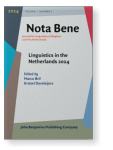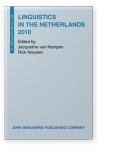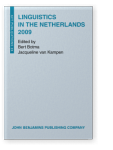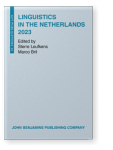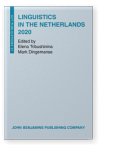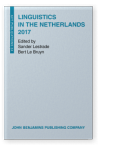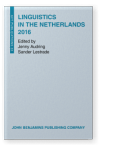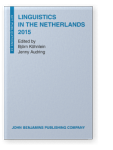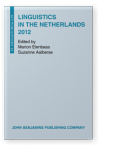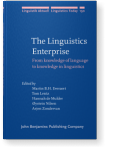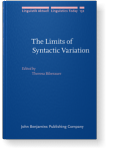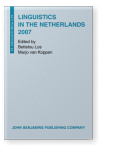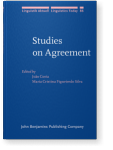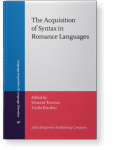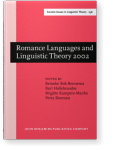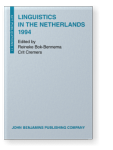Jacqueline van Kampen
List of John Benjamins publications for which Jacqueline van Kampen plays a role.
Journal
Titles
Linguistics in the Netherlands 2010
Edited by Jacqueline van Kampen and Rick Nouwen
[Linguistics in the Netherlands, 27] 2010. v, 140 pp.
Subjects Theoretical linguistics
Linguistics in the Netherlands 2009
Edited by Bert Botma and Jacqueline van Kampen
[Linguistics in the Netherlands, 26] 2009. v, 148 pp.
Subjects Theoretical linguistics
2024 Met zonder jas and other antonym errors in the spontaneous speech of Dutch children Linguistics in the Netherlands 2024, Bril, Marco and Kristel Doreleijers (eds.), pp. 117–132 | Article
This paper focuses on antonym pairs in child Dutch. Children sometimes erroneously use the opposite word from what they intend to mean with <±polar> pairs. Psycholinguistic studies in the 1970ties suggest that the <−polar> member of dimensional adjectives, motion verbs and temporal adverbs is… read more
2023 Everything is not equal in adult and child Dutch: The scope of universal quantifiers with negation Linguistics in the Netherlands 2023, Leufkens, Sterre and Marco Bril (eds.), pp. 120–136 | Article
An investigation into the production of universal quantifiers with negation in the CHILDES database of Dutch shows several scopal properties that have not been discussed before. First, it shows a crucial distinction between child and adult Dutch. A universal quantifier with scope over negation… read more
2023 Dit is Laura-se (trui): The spreading of the possessive se constructionin Dutch Linguistics in the Netherlands 2023, Leufkens, Sterre and Marco Bril (eds.), pp. 137–154 | Article
Dutch children temporarily use a possessor se construction with proper/kinship names and pronouns, like dit is Laura-se/opa-se/hem-se jas (‘this is Laura’s/grandpa’s/his coat’). The se possessive is not available in standard Dutch, although examples of it are found on the internet. The se… read more
2020 Discourse-related V1 declaratives in Dutch Linguistics in the Netherlands 2020, Tribushinina, Elena and Mark Dingemanse (eds.), pp. 149–164 | Article
This paper discusses two types of discourse-related V1 declaratives in Dutch. The first type involves a missing argument. In the position before the finite verb a referential 3rd person pronoun is deleted. The deletion of the pronoun is constrained by the recoverability condition, which requires… read more
2017 Afrikaans directionality switch in ‘triple’ V-clusters with the auxiliary het Linguistics in the Netherlands 2017, Lestrade, Sander and Bert Le Bruyn (eds.), pp. 77–91 | Article
The general perspective of the paper is that all (dis)harmonic branching orders within the West-Germanic V-clusters imply a different categorization by the acquisition procedure that should be independently motivated. More specific, the paper discusses the directionality switch with the temporal… read more
2016 Deriving verb-cluster variation in Dutch and German Linguistics in the Netherlands 2016, Audring, Jenny and Sander Lestrade (eds.), pp. 54–69 | Article
The difference in West-Germanic V(erb)-clusters, right-branching (Dutch) and left-branching (German), follows from a difference in the acquisition of V-second. The decisive factor is a rightward selection of the <+Aux> verbs in Dutch main clauses. That decisive factor had already been acquired… read more
2015 Crossover restrictions, A-bar pronouns and discourse antecedents Linguistics in the Netherlands 2015, Köhnlein, Björn and Jenny Audring (eds.), pp. 88–104 | Article
The difference between weak crossovers and weakest crossovers is usually derived from a distinction between quantifiers and non-quantifiers (Lasnik & Stowell 1991). In this paper I will derive crossover restrictions from a new example set, long movement constructions with Dutch A-bar pronouns.… read more
2012 Obviation properties of the d-pronoun in Dutch Linguistics in the Netherlands 2012, Elenbaas, Marion and Suzanne Aalberse (eds.), pp. 68–81 | Article
The present paper discusses a decisive difference in Dutch between the d(emonstrative)-pronoun and the p(ersonal)-pronoun. The d-pronoun is a grammatical device for focus-to-topic-shift. Van Kampen (2010) derived this from two properties of the d-pronoun , neither of them present in the p-pronoun.… read more
2010 The learnability of A-bar chains The Linguistics Enterprise: From knowledge of language to knowledge in linguistics, Everaert, Martin B.H., Tom Lentz, Hannah N.M. De Mulder, Øystein Nilsen and Arjen Zondervan (eds.), pp. 115–140 | Article
This paper discusses the learnability of long wh-questions. Taking longitudinal data from child Dutch an example, I will show that the acquisition of long wh-movement has been thoroughly prepared in previous acquisition steps. Each step defines a local relation that is preserved in the next… read more
2008 Parameter setting and input reduction The Limits of Syntactic Variation, Biberauer, Theresa (ed.), pp. 483–515 | Article
The language acquisition procedure identifies certain properties of the targetgrammar before others. The evidence from the input is processed in a stepwiseorder. Section 1 equates that order and its typical effects with an order ofparameter setting. The question is how the acquisition procedure… read more
2007 Relative agreement in Dutch Linguistics in the Netherlands 2007, Los, Bettelou and Marjo van Koppen (eds.), pp. 112–124 | Article
2006 The acquisition of the standard EPP in Dutch and French Studies on Agreement, Costa, João and Maria Cristina Figueiredo Silva (eds.), pp. 99–119 | Article
2006 Early operators and late topic-drop/pro-drop The Acquisition of Syntax in Romance Languages, Torrens, Vincent and Linda Escobar (eds.), pp. 203–223 | Article
This paper compares two reduction principles in child language, Tense/Agreement Omission (Schütze 1997;Wexler 1998) and Root Peripheral Truncation (Rizzi 1994, 2001). The paper argues that the empirical content of these proposals as well as their partial overlap follows from an inherent hierarchy… read more
2004 Learnability Order in the French Pronominal System Romance Languages and Linguistic Theory 2002: Selected papers from ‘Going Romance’, Groningen, 28–30 November 2002, Bok-Bennema, Reineke, Bart Hollebrandse, Brigitte Kampers-Manhe and Petra Sleeman (eds.), pp. 163–182 | Article
1994 The learnability of the Left Branch Condition Linguistics in the Netherlands 1994, Bok-Bennema, Reineke and Crit Cremers (eds.), pp. 83–94 | Article
